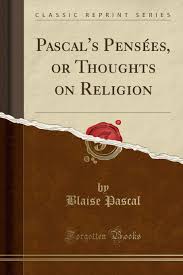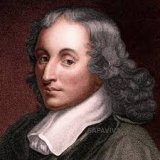Pensées Page #5
The Pensées is a collection of fragments on theology and philosophy written by 17th-century philosopher and mathematician Blaise Pascal. Pascal's religious conversion led him into a life of asceticism, and the Pensées was in many ways his life's work. The Pensées represented Pascal's defense of the Christian religion.
We cannot quite understand any of the parts, fragmentary as they are, without some understanding of the whole. Capital, for instance, is his analysis of the three orders: the order of nature, the order of mind, and the order of charity. These three are discontinuous; the higher is not implicit in the lower as in an evolutionary doctrine it would be.[D] In this distinction Pascal offers much about which the modern world would do well to think. And indeed, because of his unique combination and balance of qualities, I know of no religious writer more pertinent to our time. The great mystics like St. John of the Cross, are primarily for readers with a special determination of purpose; the devotional writers, such as St. François de Sales, are primarily for those who already feel consciously desirous of the love of God; the great theologians are for those interested in theology. But I can think of no Christian writer, not Newman even, more to be commended than Pascal to those who doubt, but who have the mind to conceive, and the sensibility to feel, the disorder, the futility, the meaninglessness, the mystery of life and suffering, and who can only find peace through a satisfaction of the whole being. [D] An important modern theory of discontinuity, suggested partly by Pascal, is sketched in the collected fragments of Speculations by T. E. Hulme (Kegan Paul). T. S. ELIOT. CONTENTS Page INTRODUCTION By T. S. Eliot vii SECTION I. THOUGHTS ON MIND AND ON STYLE 1 II. THE MISERY OF MAN WITHOUT GOD 14 III. OF THE NECESSITY OF THE WAGER 52 IV. OF THE MEANS OF BELIEF 71 V. JUSTICE AND THE REASON OF EFFECTS 83 VI. THE PHILOSOPHERS 96 VII. MORALITY AND DOCTRINE 113 VIII. THE FUNDAMENTALS OF THE CHRISTIAN RELIGION 152 IX. PERPETUITY 163 X. TYPOLOGY 181 XI. THE PROPHECIES 198 XII. PROOFS OF JESUS CHRIST 222 XIII. THE MIRACLES 238 XIV. APPENDIX: POLEMICAL FRAGMENTS 257 NOTES 273 INDEX 289 * * * * * NOTE Passages erased by Pascal are enclosed in square brackets, thus []. Words, added or corrected by the editor of the text, are similarly denoted, but are in italics. It has been seen fit to transfer Fragment 514 of the French edition to the Notes. All subsequent Fragments have accordingly been renumbered. SECTION I THOUGHTS ON MIND AND ON STYLE 1 The difference between the mathematical and the intuitive mind.[1]--In the one the principles are palpable, but removed from ordinary use; so that for want of habit it is difficult to turn one's mind in that direction: but if one turns it thither ever so little, one sees the principles fully, and one must have a quite inaccurate mind who reasons wrongly from principles so plain that it is almost impossible they should escape notice. But in the intuitive mind the principles are found in common use, and are before the eyes of everybody. One has only to look, and no effort is necessary; it is only a question of good eyesight, but it must be good, for the principles are so subtle and so numerous, that it is almost impossible but that some escape notice. Now the omission of one principle leads to error; thus one must have very clear sight to see all the principles, and in the next place an accurate mind not to draw false deductions from known principles. All mathematicians would then be intuitive if they had clear sight, for they do not reason incorrectly from principles known to them; and intuitive minds would be mathematical if they could turn their eyes to the principles of mathematics to which they are unused. The reason, therefore, that some intuitive minds are not mathematical is that they cannot at all turn their attention to the principles of mathematics. But the reason that mathematicians are not intuitive is that they do not see what is before them, and that, accustomed to the exact and plain principles of mathematics, and not reasoning till they have well inspected and arranged their principles, they are lost in matters of intuition where the principles do not allow of such arrangement. They are scarcely seen; they are felt rather than seen; there is the greatest difficulty in making them felt by those who do not of themselves perceive them. These principles are so fine and so numerous that a very delicate and very clear sense is needed to perceive them, and to judge rightly and justly when they are perceived, without for the most part being able to demonstrate them in order as in mathematics; because the principles are not known to us in the same way, and because it would be an endless matter to undertake it. We must see the matter at once, at one glance, and not by a process of reasoning, at least to a certain degree. And thus it is rare that mathematicians are intuitive, and that men of intuition are mathematicians, because mathematicians wish to treat matters of intuition mathematically, and make themselves ridiculous, wishing to begin with definitions and then with axioms, which is not the way to proceed in this kind of reasoning. Not that the mind does not do so, but it does it tacitly, naturally, and without technical rules; for the expression of it is beyond all men, and only a few can feel it. Intuitive minds, on the contrary, being thus accustomed to judge at a single glance, are so astonished when they are presented with propositions of which they understand nothing, and the way to which is through definitions and axioms so sterile, and which they are not accustomed to see thus in detail, that they are repelled and disheartened. But dull minds are never either intuitive or mathematical. Mathematicians who are only mathematicians have exact minds, provided all things are explained to them by means of definitions and axioms; otherwise they are inaccurate and insufferable, for they are only right when the principles are quite clear.
Translation
Translate and read this book in other languages:
Select another language:
- - Select -
- 简体中文 (Chinese - Simplified)
- 繁體中文 (Chinese - Traditional)
- Español (Spanish)
- Esperanto (Esperanto)
- 日本語 (Japanese)
- Português (Portuguese)
- Deutsch (German)
- العربية (Arabic)
- Français (French)
- Русский (Russian)
- ಕನ್ನಡ (Kannada)
- 한국어 (Korean)
- עברית (Hebrew)
- Gaeilge (Irish)
- Українська (Ukrainian)
- اردو (Urdu)
- Magyar (Hungarian)
- मानक हिन्दी (Hindi)
- Indonesia (Indonesian)
- Italiano (Italian)
- தமிழ் (Tamil)
- Türkçe (Turkish)
- తెలుగు (Telugu)
- ภาษาไทย (Thai)
- Tiếng Việt (Vietnamese)
- Čeština (Czech)
- Polski (Polish)
- Bahasa Indonesia (Indonesian)
- Românește (Romanian)
- Nederlands (Dutch)
- Ελληνικά (Greek)
- Latinum (Latin)
- Svenska (Swedish)
- Dansk (Danish)
- Suomi (Finnish)
- فارسی (Persian)
- ייִדיש (Yiddish)
- հայերեն (Armenian)
- Norsk (Norwegian)
- English (English)
Citation
Use the citation below to add this book to your bibliography:
Style:MLAChicagoAPA
"Pensées Books." Literature.com. STANDS4 LLC, 2024. Web. 25 Nov. 2024. <https://www.literature.com/book/pens%C3%A9es_114>.




Discuss this Pensées book with the community:
Report Comment
We're doing our best to make sure our content is useful, accurate and safe.
If by any chance you spot an inappropriate comment while navigating through our website please use this form to let us know, and we'll take care of it shortly.
Attachment
You need to be logged in to favorite.
Log In